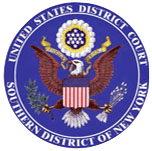
An injunction is a legal and equitable remedy in the form of a special court order that compels a party to do or refrain from specific acts. "When a court employs the extraordinary remedy of injunction, it directs the conduct of a party, and does so with the backing of its full coercive powers." A party that fails to comply with an injunction faces criminal or civil penalties, including possible monetary sanctions and even imprisonment. They can also be charged with contempt of court. Counterinjunctions are injunctions that stop or reverse the enforcement of another injunction.
Interpleader is civil procedure that allows a plaintiff or a defendant to initiate a lawsuit in order to compel two or more other parties to litigate a dispute. An interpleader action originates when the plaintiff holds property on behalf of another, but does not know to whom the property should be transferred. It is often used to resolve disputes arising under insurance contracts.

Fox News Network, LLC, v. Penguin Group (USA), Inc., and Alan S. Franken was a civil lawsuit filed in the United States District Court for the Southern District of New York on August 7, 2003. Fox News Channel, the plaintiff, sought to enjoin Al Franken from using Fox's trademark phrase "fair & balanced" in the title of his then-forthcoming book, Lies and the Lying Liars Who Tell Them: A Fair and Balanced Look at the Right. Judge Denny Chin denied Fox's motion for injunction on August 22, and the network dropped the suit three days later.
Scheidler v. National Organization for Women, 547 U.S. 9 (2006), was a lengthy and high-profile U.S. legal case interpreting and applying the federal Racketeer Influenced and Corrupt Organizations Act (RICO): a law originally drafted to combat the mafia and organized crime, the Hobbs Act: an anti-extortion law prohibiting interference with commerce by violence or threat of violence, and the Travel Act: a law prohibiting interstate travel in support of racketeering.
In re Debs, 158 U.S. 564 (1895), was a US labor law case of the United States Supreme Court decision handed down concerning Eugene V. Debs and labor unions.

New York v. Connecticut, 4 U.S. 1 (1799), was a lawsuit heard by the Supreme Court of the United States between the State of New York against the State of Connecticut in 1799 that arose from a land dispute between private parties. The case was the first case in which the Supreme Court exercised its original jurisdiction under Article III of the United States Constitution to hear controversies between two states.

Clawson v. United States, 113 U.S. 143 (1885), was a case regarding a Utah territorial statute which authorized an appeal by a defendant in a criminal action from a final judgment of conviction, which provides that an appeal shall stay execution upon filing with the clerk a certificate of a judge that in his opinion there is probable cause for the appeal, and further provides that after conviction, a defendant who has appealed may be admitted to bail as of right when the judgment is for the payment of a fine only, and as matter of discretion in other cases, does not confer upon a defendant convicted and sentenced to pay a fine and be imprisoned the right, after appeal and filing of certificate of probable cause, to be admitted to bail except within the discretion of the court.
Bicknell v. Comstock, 113 U.S. 149 (1885), was an action to recover the cost paid for a tract of land in Iowa and the value of the improvements made by the defendant. The complaint alleged a conveyance by Bicknell to one Bennett, the subsequent transfer to the defendant by sundry mesne conveyances, valuable improvements on the premises made by Bennett and his grantees, and a failure of title in Bicknell when the deed was made by reason of a superior title in the State of Iowa under a land grant. Judgment below for plaintiff, to reverse which this writ of error was brought.
Sully v. Drennan, 113 U.S. 287 (1885), was an appeal from an order of the Circuit Court for the Southern District of Iowa in the United States remanding to the state court a case which had been removed from the state into the circuit court.
Avegno v. Schmidt, 113 U.S. 293 (1885), was a case in which the United States Supreme Court held that title to property confiscated during the American Civil War was properly held by the mortgagor.
Morgan v. Hamlet, 113 U.S. 449 (1885), was a bill in equity filed by the appellants, September 3, 1879.
Union Pacific Railway Co. v. Cheyenne, 113 U.S. 516 (1885), was an appeal from the Supreme Court of the Territory of Wyoming regarding a bill charging that the collection of an illegal tax would involve the plaintiff in a multiplicity of suits as to the title of lots being laid out and sold, which would prevent their sale, and which would cloud the title to all his real estate, states a case for relief in equity.
Erhardt v. Boaro, 113 U.S. 527 (1885), was an action for the possession of a mining claim in Pioneer mining district, in the County of Dolores, and State of Colorado. The claim was designated by the plaintiff as "The Hawk Lode" mining claim, and by the defendants as "The Johnny Bull Lode" mining claim. It contains two counts. The first alleges that the right of possession of the claim by the plaintiff on June 17, 1880, is by virtue of its location pursuant to the laws of the United States and of the state, and the local rules and customs of miners in the district, and by virtue of priority of possession, the wrongful entry upon the premises by the defendants on the thirtieth of that month, their outing the plaintiff therefrom, and unlawfully withholding the possession from him, to his damage of $50,000. The second count, in addition to the citizenship of the parties, the possession of the claim by the plaintiff, and the subsequent wrongful entry of the defendants, and their ousting him, alleges that the defendants worked and mined in the claim, and dug out and removed from it large quantities of gold and silver bearing ore of the value of $50,000, to the damage of the plaintiff in that amount. The plaintiff therefore prays judgment for the possession of the mining premises and for damages of $100,000.
Peugh v. Davis, 113 U.S. 542 (1885), was a suit in equity for redeeming unoccupied and unenclosed city lots from a mortgage, continued from a case brought to the high court during the October 1877 term, the question then was whether certain instruments of writing, made by Peugh to Davis constituted an absolute conveyance of lots in the District of Columbia or were in the nature of a mortgage security for loan of money. The court was of opinion that, on all the facts of the case, the latter was the true construction of the transaction between the parties. Respondent defended against complainant's claim to redeem by setting up that the alleged mortgage was an absolute conveyance. This being decided adversely, held that, in accounting as mortgagee in constructive possession, he was not liable for a temporary speculative rise in the value of the tract, which subsequently declined—both during the time of such possession.
Fussell v. Gregg, 113 U.S. 550 (1885), was an appeal from the United States District Court for the Northern District of Ohio regarding a bill in equity filed November 20, 1879, to establish the title of the plaintiff to, and recover the possession of, a certain tract of land in the County of Logan, in the State of Ohio, and for an account of rents and profits. The dispute was one of many issues with land titles in the former Virginia Military District section of Ohio.
Erhardt v. Boaro can refer to:
Dennis v. Sparks, 449 U.S. 24 (1980), was a case in which the Supreme Court of the United States held that individuals who bribed a judge for an injunction were not protected by judicial immunity and therefore could be held liable for the damages resulting from the injunction.
Ex parte Fisk, 113 U.S. 713 (1885), was a case in which Francis B. Fogg brought suit in the Supreme Court of the State of New York against Fisk to recover the sum of $63,250 on the allegation of false and fraudulent representations made by Fisk in the sale of certain mining stocks. Fisk was held in contempt when he declined to answer questions his attorney believed violated the Fifth Amendment.
Gregory v. Hartley, 113 U.S. 742 (1885), was a case in error to the Supreme Court of the State of Nebraska where it was decided and reaffirmed that the words "term at which said cause could be first tried and before the trial thereof," Act of March 3, 1875, c. 137, § 3, 18 Stat. 471, mean the first term at which the cause is in law triable, i.e., in which it would stand for trial if the parties had taken the usual steps as to pleadings and other preparations. Babbitt v. Clark, 103 U.S. 808, and Pullman Palace Car Co. v. Speck, ante, 113 U.S. 87.

Société Nationale Industrielle Aérospatiale v Lee Kui Jak[1987] UKPC 12, [1987] AC 871 is a judicial decision of Privy Council on appeal from Brunei which was for many years, and arguably still is, the leading authority in relation to anti-suit injunctions under the English common law.





